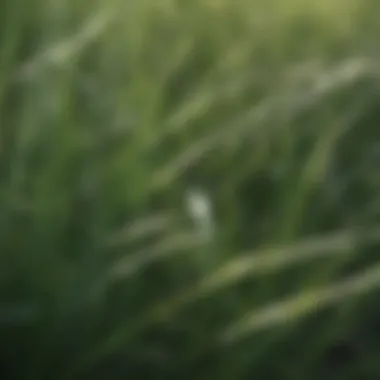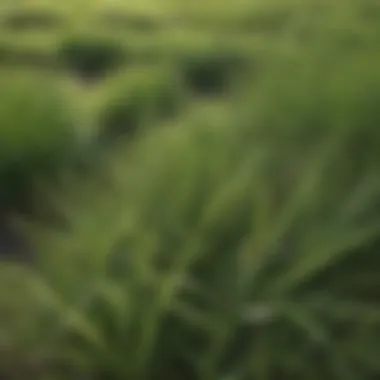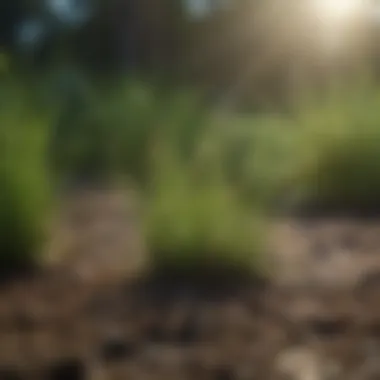Exploring the Diverse Range of Bermuda Grass Varieties: An In-depth Guide


Plant Species Profile
In the lush world of Bermuda grasses lies a diverse array of varieties, each with its own set of unique characteristics and growth patterns. This comprehensive guide delves into the depths of these grasses, shedding light on their distinct attributes and providing valuable insights for cultivating the perfect green carpet for your landscaping needs. From the resilient Quickstand Bermuda to the hardy Princess Bermuda, each type offers a different appeal and functionality. Understanding the nuances of each variety is essential for making an informed decision that aligns with your landscaping vision.
Environmental Considerations
Before embarking on the journey of selecting the ideal Bermuda grass variety, it is imperative to comprehend the environmental conditions required for optimal growth. Factors such as sunlight exposure, soil type, and irrigation needs play a significant role in determining the suitability of a particular grass type for your landscape. Some varieties thrive in full sun, while others prefer partial shade. Likewise, certain Bermuda grasses are more tolerant of varying soil pH levels, making them adaptable to a wider range of environments. By considering these environmental factors, you can ensure that your chosen Bermuda grass variety flourishes in its designated space, enhancing the overall aesthetic appeal of your landscape.
Growth Patterns and Maintenance
Each variety of Bermuda grass exhibits distinct growth patterns, from the fine texture of the Tifway 419 to the dense carpet-like appearance of the Common Bermuda. Understanding these growth patterns is essential for proper maintenance and care of your lawn. Some varieties may require frequent mowing to maintain their desired height, while others may have a slower growth rate, reducing the need for constant upkeep. Additionally, factors such as water requirements, fertilization schedules, and pest control measures vary among different Bermuda grass types, necessitating tailored maintenance practices for optimal growth. By familiarizing yourself with the specific growth patterns and maintenance needs of your chosen variety, you can cultivate a vibrant and healthy lawn that serves as a testament to your landscaping expertise.
Ideal Environments for Cultivation
Creating an optimal environment for Bermuda grass cultivation involves careful consideration of various factors that contribute to its overall health and vitality. Whether you reside in a warm coastal region or a cool inland area, selecting a Bermuda grass variety that is well-suited to your local climate is essential for long-term success. Factors such as temperature tolerance, drought resistance, and disease susceptibility should inform your choice of grass variety, ensuring that it thrives in its designated environment. By adhering to best practices for soil preparation, seeding techniques, and irrigation management, you can create a conducive environment that fosters the growth and resilience of your chosen Bermuda grass variety, transforming your landscape into a verdant oasis of natural beauty and tranquility.
Introduction to Bermuda Grasses
Bermuda grasses are a versatile and resilient species that offer a range of benefits and uses in various environments. Understanding different varieties of Bermuda grass can provide valuable insights into choosing the most suitable option for landscaping needs. From their origins to key features and benefits, Bermuda grasses play a vital role in creating lush, green landscapes.
Understanding Bermuda Grass
Origin and Background
The origin and background of Bermuda grass date back to historical records, showcasing its long-standing presence in the world of landscaping. This grass's ability to thrive in diverse climates and soil conditions makes it a popular choice for many garden enthusiasts. Its adaptability and resilience are key factors that contribute to its widespread usage.
Key Features
Bermuda grass boasts key features such as rapid growth, drought tolerance, and low maintenance requirements. These features make it an attractive option for landscaping projects seeking durable and visually appealing ground cover. Its dense growth pattern and vibrant green color add to its allure as a landscaping staple.
Benefits of Bermuda Grass
The benefits of Bermuda grass are manifold, including its ability to withstand heavy foot traffic, recover quickly from damage, and resist pests and diseases. These advantages make it a preferred choice for areas that experience high activity levels or challenging environmental conditions.
Cultivation of Bermuda Grass
Soil Requirements


Bermuda grass thrives in well-drained soil with moderate fertility levels. It performs best in slightly acidic soil conditions and shows remarkable adaptability to different soil types. Understanding the specific soil requirements of Bermuda grass can significantly impact its growth and overall health.
Watering Needs
Proper watering is crucial for the successful cultivation of Bermuda grass. While it is known for its drought tolerance, regular watering is essential during the establishment phase and prolonged dry spells. Balancing water consumption to prevent over-saturation is key to maintaining healthy Bermuda grass.
Maintenance Practices
Maintaining Bermuda grass involves regular mowing, adequate fertilization, and pest control measures. Proper maintenance practices contribute to the grass's longevity and vibrant appearance, ensuring a lush and healthy lawn or landscape. Attention to detail in maintenance routines results in a well-kept and verdant Bermuda grass area.
Common Uses of Bermuda Grass
Landscaping
Bermuda grass is a popular choice for landscaping projects due to its ability to form dense, uniform carpets of grass. Its high tolerance for heat and sun exposure makes it suitable for creating visually appealing lawns and green spaces in residential and commercial settings.
Sports Fields
Sports fields benefit from Bermuda grass's durability and quick recovery from damage. Its ability to withstand intense wear and tear makes it an ideal turfgrass for athletic fields, providing a safe and reliable surface for various sports activities.
Golf Courses
Bermuda grass is a preferred grass type for golf courses worldwide due to its ability to create well-defined fairways and greens. Its dense growth habit and ability to recover quickly from divots and footprints make it a top choice for maintaining pristine golf course landscapes.
Popular Varieties of Bermuda Grass
Popular varieties of Bermuda grass play a crucial role in this comprehensive guide, offering a diverse range of options for landscaping enthusiasts. These grass varieties come with unique characteristics, growth patterns, and ideal cultivation environments, making them essential considerations for anyone looking to enhance their outdoor spaces.
Tifway Bermuda Grass
Characteristics
Tifway 419 Bermuda Grass is known for its dense and lush growth, making it a popular choice for lawns and sports fields alike. Its key characteristic lies in its rapid spreading ability, resulting in a thick turf that can withstand heavy foot traffic. This feature makes it highly beneficial for areas that require a durable and beautiful grass cover. Although its growth rate is exceptionally fast, it also necessitates regular mowing to maintain its manicured appearance.
Ideal Growing Conditions
Thriving in full sun, Tifway 419 Bermuda Grass flourishes in warm climates with good drainage. It requires a consistent watering schedule to promote healthy growth. Additionally, regular fertilization aids in sustaining its vibrant green color. These ideal growing conditions allow Tifway 419 to establish strong roots and resist common lawn diseases, ensuring a robust and attractive turf.
Applications


Due to its dense nature and wear tolerance, Tifway 419 Bermuda Grass is often used in high-traffic areas such as sports fields, golf courses, and parks. Its ability to recover quickly from stress and damage makes it a preferred choice for locations that undergo frequent use. Landscapers appreciate its versatility in various settings, showcasing its adaptability to different soil types and maintenance practices. While it thrives in warm climates, it may require overseeding in cooler regions for year-round lushness.
Lesser-Known Types of Bermuda Grass
In the realm of Bermuda grass varieties, exploring the lesser-known types opens up a world of unique possibilities for landscaping enthusiasts and horticulture professionals seeking diversity in their green spaces. While some may gravitate towards the popular mainstream selections, delving into the nuances of these less commonly showcased options can provide a deeper understanding of the breadth and depth of Bermuda grass varieties available in the market. The lesser-known types of Bermuda grass offer a chance to experiment with uncharted territory, potentially uncovering hidden gems that may perfectly align with specific cultivation requirements or aesthetic preferences. By shedding light on these underappreciated variants, this article seeks to broaden the horizons of readers, encouraging them to consider a wider spectrum of possibilities when it comes to selecting Bermuda grass for their landscaping endeavors.
Princess Bermuda Grass
Special Attributes
When it comes to Princess 77 Bermuda Grass, one cannot help but be captivated by its standout feature - exceptional drought tolerance. This unique characteristic sets Princess 77 apart from its counterparts, showcasing its ability to thrive in arid conditions where other grasses may falter. The remarkable drought resistance of Princess 77 makes it a highly sought-after choice for regions plagued by water scarcity or prolonged periods of dry weather. Its capacity to maintain lush greenery even in challenging environments elevates Princess 77 to a prominent position among Bermuda grass varieties. While its drought tolerance is undoubtedly a key selling point, it is essential to note that Princess 77's resilience does not compromise its visual appeal or vitality, making it a versatile and reliable option for landscaping projects.
Optimal Climates
Princess 77 Bermuda Grass is best suited for regions characterized by hot summers and limited precipitation, making it an ideal candidate for areas with semi-arid or Mediterranean climates. Its preference for warm weather and sunny disposition align perfectly with the climatic conditions of such regions, allowing Princess 77 to thrive and flourish without extensive maintenance or intervention. The optimal climates for Princess 77 not only ensure its viability but also enhance its overall performance, promoting healthy growth and sustained vibrancy throughout the growing season. By understanding the specific climatic requirements of Princess 77, cultivators can harness its full potential, harnessing its natural strengths to create stunning landscapes even in the face of climatic challenges.
Best Practices
Incorporating Princess 77 Bermuda Grass into landscaping projects comes with a set of recommended best practices aimed at maximizing its growth and longevity. Adequate sunlight exposure is essential for this variety, as it thrives in full sun conditions that facilitate optimal photosynthesis and metabolic processes. Additionally, Princess 77 benefits from a well-draining soil structure that prevents waterlogging and promotes robust root development, ensuring its resilience against adverse weather conditions and potential diseases. Regular maintenance practices such as mowing at the appropriate height, moderate watering to foster deep root growth, and periodic fertilization to replenish essential nutrients are key to sustaining Princess 77's health and vitality. By adhering to these best practices, cultivators can harness the full potential of Princess 77 Bermuda Grass, enjoying its aesthetic charm and functional benefits for years to come.
Comparative Analysis of Bermuda Grass Varieties
In the realm of Bermuda grasses, engaging in a comparative analysis holds paramount significance for enthusiasts and cultivators. Understanding the nuances and disparities among different varieties is crucial for making informed decisions in landscaping endeavors. This section delves deep into the specific elements that differentiate various Bermuda grass types, shedding light on their individual strengths, weaknesses, and suitability for diverse environments. By examining the comparative analysis meticulously, readers can decipher the optimal choice tailored to their unique requirements.
Key Factors for Evaluation
Drought Resistance
Delving into the domain of drought resistance unveils a pivotal trait that shapes the resilience of Bermuda grass varieties against arid conditions. The capacity of a particular breed to withstand prolonged periods of drought without compromising on vitality is a pivotal consideration for landscapers and cultivators. Highlighting this attribute not only underscores the robust nature of Bermuda grass but also accentuates its adaptability to changing climates. Incorporating species with high drought resistance in landscaping schemes can ensure sustainable growth and minimal water dependency, making it a favorable option for regions prone to dry spells.
Wear Tolerance
Wear tolerance plays a significant role in evaluating Bermuda grass varieties, especially in high-traffic areas such as sports fields and golf courses. The ability of a specific grass type to endure consistent foot traffic without succumbing to damage or wear marks influences its suitability for recreational spaces. Emphasizing wear tolerance ensures longevity and aesthetic appeal, as the grass remains lush and resilient under heavy usage. Selecting Bermuda grass varieties with commendable wear tolerance guarantees durability and visual appeal, making them a preferred choice for landscapes requiring robust turf cover.
Shade Adaptability
Shade adaptability emerges as a critical factor in the evaluation of Bermuda grass varieties, particularly for areas exposed to varying light intensities. The capacity of a grass species to thrive in shaded regions while maintaining vigor and greenery highlights its adaptability to diverse environments. Recognizing the importance of shade tolerance accentuates the versatility and resilience of Bermuda grass types, enabling them to flourish even in conditions with limited sunlight. Opting for Bermuda grass varieties renowned for their shade adaptability ensures consistent growth and vibrancy, making them versatile selections for shaded landscapes.
Performance Metrics


Growth Rate
Assessing the growth rate of Bermuda grass varieties provides valuable insights into their development patterns and maintenance requirements. Understanding how quickly a specific breed establishes roots and spreads across the landscape aids in planning and executing landscaping projects effectively. The growth rate signifies the vigor and expansiveness of Bermuda grass types, guiding cultivators in determining the optimal spacing and upkeep regimen for sustainable growth. Selecting varieties with an ideal growth rate ensures prompt establishment and lush coverage, enhancing the visual appeal and functionality of landscaped areas.
Root Development
Root development serves as a cornerstone in evaluating Bermuda grass varieties, as robust root systems are indicative of long-term stability and vitality. The depth and strength of a grass species' roots impact its ability to access nutrients, water, and support, influencing overall health and resilience. Prioritizing varieties with extensive root development guarantees enhanced soil retention, erosion control, and drought tolerance, contributing to the longevity and sustainability of landscaped areas. Opting for Bermuda grass breeds with superior root development fortifies landscapes against adverse conditions and promotes enduring lushness.
Pest Resilience
Pest resilience emerges as a critical factor in gauging the durability and sustainability of Bermuda grass varieties in diverse environments. The ability of a grass type to resist common pests and diseases underscores its robust nature and minimizes the need for extensive chemical interventions. Highlighting pest resilience accentuates the low-maintenance aspect of Bermuda grass cultivation, reducing the reliance on insecticides and ensuring a thriving landscape. Selecting varieties with inherent pest resilience safeguards against detrimental infestations, preserving the appeal and functionality of landscaped areas with natural resilience and minimal intervention.
Choosing the Right Bermuda Grass for Your Needs
In the realm of landscaping and turf management, selecting the appropriate type of Bermuda grass can significantly impact the overall aesthetic appeal and functionality of outdoor spaces. Choosing the right Bermuda grass demands careful consideration of various factors to ensure optimal growth, resilience, and performance. By understanding the specific requirements of your landscape and intended use, you can make an informed decision that aligns with your preferences and maintenance capabilities. This section explores the essential elements that play a vital role in selecting the ideal Bermuda grass variety for your unique needs.
Factors to Consider
Climate Conditions
Climate conditions play a pivotal role in determining the success and sustainability of Bermuda grass in a particular environment. The adaptability of Bermuda grass to different climatic zones and weather patterns is crucial for its long-term health and development. By considering factors such as temperature ranges, precipitation levels, and sunlight exposure, you can identify the most suitable Bermuda grass variety that thrives in your local climate. Understanding the specific climate requirements of different Bermuda grass types will enable you to make a well-informed decision based on the prevailing weather conditions in your area and ensure the longevity of your landscaping investment.
Intended Use
The intended use of Bermuda grass varies depending on the purpose and function of the landscaped area. Whether you are creating a lush green lawn for recreational activities or establishing a durable turf for sports fields, the intended use dictates the characteristics and traits required from the Bermuda grass variety. Factors such as foot traffic intensity, mowing frequency, and visual appeal play a significant role in selecting the most suitable type of Bermuda grass for your specific application. By aligning the attributes of the grass with its intended use, you can ensure optimal performance and aesthetic quality that meets your landscaping objectives.
Maintenance Effort
Efficient maintenance practices are essential for preserving the health and vitality of Bermuda grass over time. The level of maintenance effort required for each Bermuda grass variety can vary based on factors such as mowing frequency, fertilization needs, and pest control measures. Understanding the maintenance requirements of different Bermuda grass types allows you to assess the time and resources needed to uphold the grass's lush appearance and vigor. By selecting a Bermuda grass variety that matches your maintenance capabilities and preferences, you can establish a sustainable landscaping routine that fosters the continued growth and beauty of your outdoor spaces.
Consulting with Experts
In the process of choosing the right Bermuda grass for your landscaping needs, consulting with experienced professionals can offer valuable insights and guidance to enhance your decision-making process. Expert advice from landscaping professionals, horticulturists, and local agricultural extension services can provide tailored recommendations based on your specific requirements and environmental conditions. Collaborating with experts in the field of turf management and horticulture allows you to benefit from their expertise and knowledge, ensuring the successful establishment and maintenance of Bermuda grass in your outdoor areas.
Landscaping Professionals
Landscaping professionals possess specialized expertise in designing and maintaining outdoor spaces, including the selection and cultivation of Bermuda grass. Their in-depth knowledge of landscaping principles and practices enables them to recommend the most suitable Bermuda grass varieties for diverse landscaping projects. By consulting with landscaping professionals, you can access professional advice on soil preparation, irrigation methods, and turf establishment techniques that optimize the growth and vitality of Bermuda grass in your landscape.
Horticulturists
Horticulturists are adept at understanding plant biology, growth cycles, and environmental factors that influence the cultivation of Bermuda grass. Their expertise in horticulture allows them to assess soil quality, nutrient requirements, and disease management strategies for promoting the health and sustainability of Bermuda grass varieties. By engaging with horticulturists, you can benefit from their comprehensive knowledge of plant care and maintenance, ensuring the successful integration of Bermuda grass into your landscaping projects.
Local Agricultural Extension Services
Local agricultural extension services offer valuable resources and assistance in navigating the complexities of turf management and landscape horticulture. These services provide access to research-based information, educational programs, and expert advice on selecting and maintaining Bermuda grass varieties suited to your local ecosystem. By leveraging the resources available through local agricultural extension services, you can enhance your understanding of Bermuda grass cultivation practices and implement sustainable approaches to landscaping that promote environmental stewardship and long-term landscape health.







